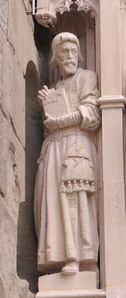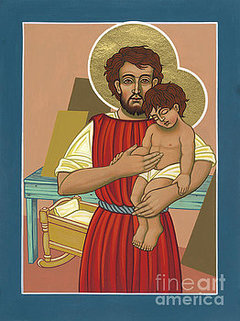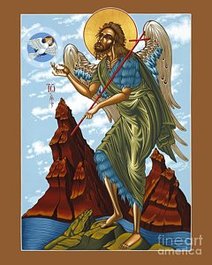 As I get older the one thing which is increasingly certain is that every day is a gift. Life, (for better or worse), is never traveled solo and thus we are accompanied by our beloved friends and family who are with us sometimes for more and sometimes for less of the path. And of course, there is our one constant companion: God. So even as things change and our physical life becomes a bit less reliable than it once was, spiritual life can – and should – continue to grow and increase. If we exercise our faith, hope, and love, and if we pray, study the Scriptures, seek God around us and within those we meet, our spiritual life will become increasingly stronger, especially when we need it most. Every day is a gift, especially because we know that tomorrow is not guaranteed to be as it was today. In fact, it is not guaranteed at all! For people of faith this is not overly daunting: we know that though we do have to carry our cross, God offers assistance (graces) on the road and helps us to make it to our goal of life with Him forever. It is important, then, that we open ourselves to the Holy Spirit in order to learn to see and hear differently so that we come to realize that truly no day is ordinary at all. Each day provides opportunities to find Jesus in the midst of our own joys and sufferings as well as in those of the people we accompany. It takes trust and time to develop the ability to see and hear in this way, but if we are mindful of God in our midst, we can accept the gift we are given with grace and even with joy.  One such opportunity to grow is provided by the prophet Malachi. His book begins with the words: “I love you, says the Lord.” It is comforting, to say the least, especially because we know that what follows in the writings of the prophet will be confrontational. Yet even with his harsh rebukes, Malachi wraps the book in love: he begins with a reminder of God’s love and he concludes with God’s promise to actually send that love into the world, which is to say, that the Messiah would come soon. He also said that the Messiah would be preceded by a forerunner who would prepare the way before Him. The last passage says: “Now I am sending to you Elijah the prophet, before the day of the Lord comes, the great and terrible day.” (Malachi 3:22-23) However, when Jesus came He clarified that it was not literally Elijah who was the forerunner, but it was the one who was to act as Elijah, namely John the Baptizer. The Book of Malachi is interesting because of its position as the last book of the Old Testament. The Old Testament books are not presented in chronological order, (except the texts within the Historical Books.) The four sections are presented like this: the Pentateuch (Law), the Historical Books, the Wisdom books (historically written last, closest to the time of Christ), and the Prophetic Books with Malachi at the end of that section. One would expect the books written closest to the time of Jesus to be found at the end of the Old Testament, but the Prophets were placed last because of the final words of Malachi’s message: the forerunner is coming to prepare the way of the Lord, the Messiah. Therefore when we ‘turn the page’ we are at the New Testament, starting with the Gospel of Matthew which begins with the genealogy of “Jesus the Christ, the son of David, the son of Abraham.” (Matt 1:1) Hence, because Malachi began his book with a reminder of God’s love and ended it with the promise of the coming Messiah, it directly connects us to the Good News of the culmination of that love, namely Jesus Christ.  What comes between that first and last passage in the Book of Malachi is not as easy to hear because Malachi did what all true prophets do: he shook up the status quo with some rather sharp accusations. We know little of who Malachi was except that he wrote in 455 BC and was concerned about the impact his words would have. To protect himself he wrote anonymously by creating the pseudonym ‘Malachi’ which came from putting together two Hebrew words that translate to ‘My Messenger.’ Thus, all we really know about this prophet is that he understood his role as a messenger of God and that it meant he was to deliver a warning to the Jewish people who had been freed from a terrible exile about 100 years earlier and were slip-sliding down a dangerous path again. This time idolatry was not the issue at the heart of it, but rather that God was displeased with their practice of intermarriage with pagans as well as the insincerity and abuses in worship which were being perpetuated by the priestly class. (The Covenant forbade marrying foreigners because the fear was that pagan practices would take root, driving the people further from God.)  Malachi made it clear that God was ‘weary’ from the people’s perversion of the Law into what they wanted it to mean rather than what God intended. They would ask “Where is the just God?” as if to rationalize their views rather than accept the truth of the Laws which had always guided them and were given them by God as a sign of His love. Malachi prophesied that there would be judgment upon those who abused their spouses, were deceitful, deprived laborers of just wages, oppressed widows and orphans, and turned aside resident aliens without regard for God’s love and mercy. God’s message went on to say that He does not change, (His love does not diminish), inviting the people to return to Him lest they fall too far away. For the Book of Malachi to be meaningful, particularly at this time of year, we should spend time in reflection and in examination of our conscience in order to look at how we are preparing our own path for the coming of Christ at the end of our life and for His triumphal return at the end of time. We are invited to let the words “I love you” spoken by the Lord be the ones which echo in our hearts and minds as we enter into each new day, desiring to see and hear the evidence of His love in whatever circumstances we might presently be experiencing. Therefore, in the spirit of Malachi, we might want to examine how we live our baptismal covenant with God with questions such as these:
 The message of Malachi to ‘clean up our act’ is something we need continually, not because we should focus on our sinfulness, but because we want to present something wonderful to the Lord when He comes. We should be grateful for Malachi’s willingness to risk the anger of his people in order to get the message of God’s love to them. And we should be grateful that as Malachi prophesied, Jesus did come simply because God loves us so much that Heaven could no longer ‘contain’ so great a love. Thus, we are reminded that to live prophetically means that we are to be ‘other Malachis,’ to become God’s messengers, intending our actions and words to announce: “I love you, says the Lord.”  Living prophetically means that we open our hearts to transformation by Christ, allowing each day to reveal the opportunities to see and hear God in new ways. Prophetic living means we are called to be a messenger of God’s love and mercy to all the people we encounter (loved ones, the poor, widowed, orphaned, resident alien, sick, lonely, and marginalized), and that we direct our efforts to preparing for the Coming of Jesus at the end of time. No day is ordinary if God is part of it. We are not ordinary if God is in our hearts and minds. And no love is ordinary if it is given by God and then shared with others. Readiness is essential for this to happen, so let us accept the opportunity and gift of these weeks at the end of the liturgical year. Indeed as implied by Malachi, the day of the coming of the Forerunner, John the Baptist, was not ordinary: no day ever is. May the end of the liturgical year be rich with God’s graces of mercy and love! May we be inspired to live prophetically like Malachi: unafraid to speak and act as a disciple of Jesus Christ! May we be God’s messenger as one who lives authentically according to our faith! May our lives convey the love and mercy of Jesus to everyone we meet, courageously reaching out to people who are especially unlike ourselves! May we appreciate the opportunity to see that no day is ordinary if it is directed toward God! And may we prepare our hearts for the coming of Christ again in glory! Peace! ©Michele L. Catanese Note: Next post will be December 3. Images: 1. I took this photo in the town of Ticonderoga, NY. I chose to use it for the opening image because it stood out. This tree did not seem ordinary, but rather it was ablaze with beauty. Many people, like me, do not get to see beautiful autumn colors very often, and so this truly was a gift. But for those who do see colors often, it is important not to take the gift for granted. 2. I took this photo in Lausanne, Switzerland. This statue is on the facade of the Lausanne Cathedral in the Old City section. Of course, it is Malachi the prophet. That he seems to be peeking out almost surreptitiously spoke to me as a symbol of his desire for anonymity. He holds the text of his writings. 3. This is another of my photos. It is the top of Lower Buttermilk Falls in Ithaca, NY. I chose the top of the falls because of the reference to "slip-sliding" in the wrong direction by the Jewish people in the 5th century BC. If one leaves the path at the top of a waterfall, one is in danger! (To be clear, I was on the path when I took this photo!) 4. This is the work of Fr. William Hart McNichols called Retablo de San Jose Obrero. I chose it because Jesus is in a pose of total vulnerability and loving trust, asleep in the arms of St. Joseph. There is so much love in this image! For a full explanation of this work, and also to understand what a retablo is, go to the artist's site: https://fineartamerica.com/featured/retablo-de-san-jose-obrero-301-william-hart-mcnichols.html While you are there you can order a copy of it or peruse the site for any other icons and images you like which can be purchased in many mediums. It is getting to be the holiday season and you might like to order some cards or a gift. (Again, I get nothing from my endorsement of Fr. Bill's work except the joy of sharing!) 5. This may seem like an odd choice: it is a painting by Henri Matisse called O Dalisque a la Culotte Rouge. (1925). I chose it, however, because the reclining woman can be viewed as being in prayerful reflection, perhaps doing an examination of conscience. But I also chose it because of something Matisse once said: "There are always flowers for those who want to see them." There are flowers throughout this painting, on the table behind the woman, and in the wallpaper. What Matisse said is exactly the point of this post: If we learn to see and hear differently, we will see God's presence in our midst. 6. This is an icon called St. John the Forerunner Also the Baptist, an icon from the work of Fr. William Hart McNichols. It seemed fitting to end with John the Forerunner since Malachi ends his writing with the prophecy of his coming. You can find it at https://fineartamerica.com/featured/st-john-the-forerunner-also-the-baptist-082-william-hart-mcnichols.html NOTE: In compliance with GDPR rules, I wish to make it clear that I do not gather any information on any of my readers at any time.
Linda Dalferes
11/19/2018 12:35:08 pm
This is so insightful! I love the idea of how we can all live as prophets..."simply" by opening our hearts to be transformed by Christ. Thank you, Michele!
David
11/28/2018 02:17:40 pm
Michele, Comments are closed.
|
Heart Speaks to Heart
|

 RSS Feed
RSS Feed

